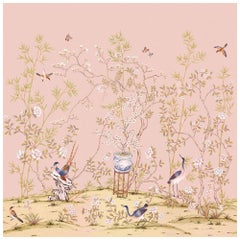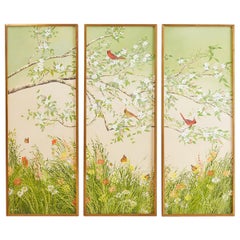Chinoiserie Triptych Panels
Recent Sales
2010s American Chinoiserie Wallpaper
Paper
20th Century American Chinoiserie Paintings
Canvas, Lacquer, Wood
2010s American Chinoiserie Wallpaper
Paper
A Close Look at Chinoiserie Furniture
Emerging in the 17th century, chinoiserie appropriated the aesthetics and imagery of popular East Asian design for European-made versions. Reflecting the exoticization of China, Japan and other countries in this era, the word directly translates from French to “Chinese-esque,” which reveals its shortcomings as a style of furniture and decor that often stereotypically and reductively mimics Asian culture rather than showcasing and paying tribute to its artistic traditions.
The enthusiastically decorative chinoiserie style was propelled by influential tastemakers including French King Louis XIV, whose Trianon de Porcelaine in 1670 was inspired by Chinese architecture. Expanded trade between the East and West led to a demand for porcelain, lacquer objects, silk and other goods, which further informed the fanciful furniture being crafted in Europe.
Artisans working in the chinoiserie style used materials and elements like pagoda shapes, bamboo, lacquer surfaces, bird and flower motifs and other interpretations of Asian design on pieces that were frequently set against vibrant wallcoverings. This whimsical approach yielded chinoiserie furniture that boasted dramatic flourishes drawing on the natural world and reflected the dominance of Rococo during the 18th century.
As chinoiserie was shaped by approximations of Asian design by European creators, it had regional variations, such as Chinese Chippendale in England where cabinets, chairs and tea tables had wooden fretwork designs and “japanned” surfaces intended to resemble lacquer work that was created in East Asia. In North America, furniture makers in Boston and New York integrated chinoiserie-painted scenes into Queen Anne furniture.
Antique chinoiserie furniture has continued to be fashionable, from its popularity with decorators of the Hollywood Regency era — James Mont, Tommi Parzinger, William Haines and Samuel Marx favored the style — to contemporary interior designers, although it brings with it a complex history.
Find a collection of chinoiserie bedroom furniture, cabinets, decorative objects and more on 1stDibs.
Finding the Right Wall-decorations for You
An empty wall in your home is a blank canvas, and that’s good news. Whether you’ve chosen to arrange a collage of paintings in a hallway or carefully position a handful of wall-mounted sculptures in your dining room, there are a lot of options for beautifying your space with the antique and vintage wall decor and decorations available on 1stDibs.
If you’re seeking inspiration for your wall decor, we’ve got some ideas (and we can show you how to arrange wall art, too).
“I recommend leaving enough space above the piece of furniture to allow for usable workspace and to protect the art from other items damaging it,” says Susana Simonpietri, of Brooklyn home design studio Chango & Co.
Hanging a single attention-grabbing large-scale print or poster over your bar or bar cart can prove intoxicating, but the maximalist approach of a salon-style hang, a practice rooted in 17th-century France, can help showcase works of various shapes, styles and sizes on a single wall or part of a wall.
If you’re planning on creating an accent wall — or just aiming to bring a variety of colors and textures into a bedroom — there is more than one way to decorate with wallpaper. Otherwise, don’t overlook what textiles can introduce to a space. A vintage tapestry can work wonders and will be easy to move when you’ve found that dream apartment in another borough.
Express your taste and personality with the right ornamental touch for the walls of your home or office — find a range of contemporary art, vintage photography, paintings and other wall decor and decorations on 1stDibs now.

